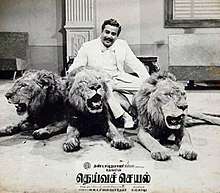Deiva Cheyal
Deiva Cheyal (transl. Divine Act) is a 1967 Indian Tamil-language film directed by M. G. Balu and produced by Sandow M. M. A. Chinnappa Thevar, who also wrote the story. The film stars Major Sundarrajan, R. Muthuraman and Bharathi Vishnuvardhan. Although not a commercial success, it was adapted into the Hindi film Haathi Mere Saathi (1971), which in turn was adapted into the Tamil film Nalla Neram (1972), both of which achieved commercial success. All three versions were produced by Sandow M. M. A. Chinnappa Thevar.
| Deiva Cheyal | |
|---|---|
 Lobby card | |
| Directed by | M. G. Balu |
| Produced by | Sandow M. M. A. Chinnappa Thevar |
| Story by | Sandow M. M. A. Chinnappa Thevar |
| Starring | Major Sundarrajan R. Muthuraman Bharathi Vishnuvardhan |
| Music by | Diwakar |
Production company | Dhandayuthapani Films |
Release date |
|
| Country | India |
| Language | Tamil |
Production
Deiva Cheyal was produced by Sandow M. M. A. Chinnappa Thevar under Dhandayuthapani Films, and directed by M. G. Balu.[1] Thevar also wrote the story,[2] while Ayyapillai wrote the dialogue.[1] Major Sundarrajan, R. Muthuraman and Bharathi Vishnuvardhan starred.[2][1] All the animals in the film had been trained to respond to commands in Hindi; since Sundarrajan could speak the language, this worked to his advantage.[3] Animals used included elephants, lions and rhinoceros.[4] The film's animal trainer told Sundarrajan that the lion would stay calm if he kept scratching its mane, when he sat astride it, and Sundarrajan did accordingly.[3] The music was composed by Diwakar, and the final cut measured 3,997 metres (13,114 ft).[1]
Release and reception
Deiva Cheyal was released on 23 June 1967.[1] The film was not commercially successful,[4] but Sundarrajan's performance was praised.[5]
Adaptations
Although Deiva Cheyal was not a commercial success, Thevar adapted it in Hindi as Haathi Mere Saathi (1971), starring Rajesh Khanna.[4] This version, the script of which was tweaked by Salim-Javed, emerged a major success, and was adapted in Tamil, again with some changes, as the M. G. Ramachandran starrer Nalla Neram (1972), which was also a success.[2] However, Thevar later opined that "the performance of both MGR and Rajesh Khanna was only 50%" of Sundarrajan's.[4]
References
- Film News Anandan (2004). Sadhanaigal Padaitha Thamizh Thiraipada Varalaru [Tamil film history and its achievements] (in Tamil). Chennai: Sivagami Publishers. Archived from the original on 8 January 2018.
- Dhananjayan, G. (15 August 2016). "Artistic amends – Flops a reservoir of hot story ideas". The Times of India. Archived from the original on 8 January 2018. Retrieved 8 January 2018.
- Krishnamachari, Suganthy (27 August 2015). "Made a 'Major' impact". The Hindu. ISSN 0971-751X. Archived from the original on 23 December 2017. Retrieved 8 January 2018.
- "Potpourri of tidbits about Tamil cinema — Director Sando Chinnapa Devar". Kalyanamalai Magazine. Archived from the original on 15 March 2016. Retrieved 8 January 2018.
- "`Major' Sundararajan dead". The Hindu. 1 March 2003. Archived from the original on 31 March 2018. Retrieved 8 January 2018.
External links
- Deiva Cheyal on IMDb